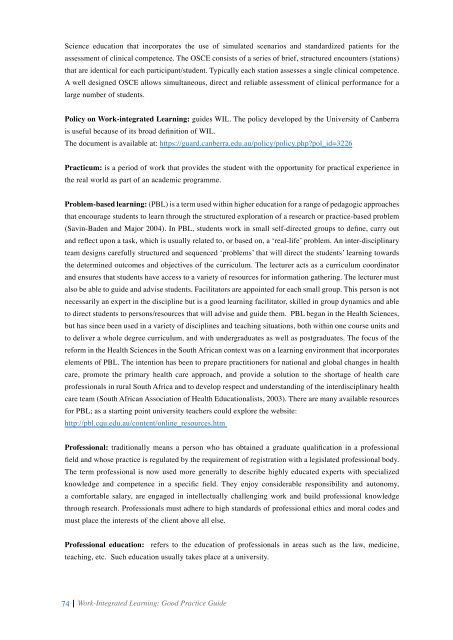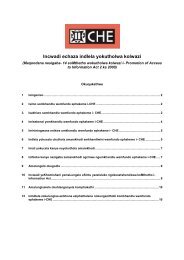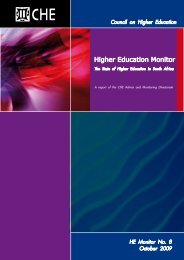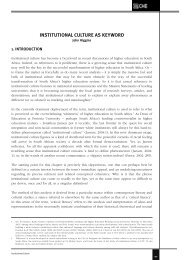Work-Integrated Learning: Good Practice Guide - CHE
Work-Integrated Learning: Good Practice Guide - CHE
Work-Integrated Learning: Good Practice Guide - CHE
Create successful ePaper yourself
Turn your PDF publications into a flip-book with our unique Google optimized e-Paper software.
Science education that incorporates the use of simulated scenarios and standardized patients for the<br />
assessment of clinical competence. the oScE consists of a series of brief, structured encounters (stations)<br />
that are identical for each participant/student. typically each station assesses a single clinical competence.<br />
A well designed oScE allows simultaneous, direct and reliable assessment of clinical performance for a<br />
large number of students.<br />
Policy on <strong>Work</strong>-integrated <strong>Learning</strong>: guides WIL. the policy developed by the university of canberra<br />
is useful because of its broad definition of WIL.<br />
the document is available at: https://guard.canberra.edu.au/policy/policy.php?pol_id=3226<br />
Practicum: is a period of work that provides the student with the opportunity for practical experience in<br />
the real world as part of an academic programme.<br />
Problem-based learning: (PBL) is a term used within higher education for a range of pedagogic approaches<br />
that encourage students to learn through the structured exploration of a research or practice-based problem<br />
(Savin-Baden and Major 2004). In PBL, students work in small self-directed groups to define, carry out<br />
and reflect upon a task, which is usually related to, or based on, a ‘real-life’ problem. An inter-disciplinary<br />
team designs carefully structured and sequenced ‘problems’ that will direct the students’ learning towards<br />
the determined outcomes and objectives of the curriculum. the lecturer acts as a curriculum coordinator<br />
and ensures that students have access to a variety of resources for information gathering. the lecturer must<br />
also be able to guide and advise students. Facilitators are appointed for each small group. this person is not<br />
necessarily an expert in the discipline but is a good learning facilitator, skilled in group dynamics and able<br />
to direct students to persons/resources that will advise and guide them. PBL began in the Health Sciences,<br />
but has since been used in a variety of disciplines and teaching situations, both within one course units and<br />
to deliver a whole degree curriculum, and with undergraduates as well as postgraduates. the focus of the<br />
reform in the Health Sciences in the South African context was on a learning environment that incorporates<br />
elements of PBL. the intention has been to prepare practitioners for national and global changes in health<br />
care, promote the primary health care approach, and provide a solution to the shortage of health care<br />
professionals in rural South Africa and to develop respect and understanding of the interdisciplinary health<br />
care team (South African Association of Health Educationalists, 2003). there are many available resources<br />
for PBL; as a starting point university teachers could explore the website:<br />
http://pbl.cqu.edu.au/content/online_resources.htm<br />
Professional: traditionally means a person who has obtained a graduate qualification in a professional<br />
field and whose practice is regulated by the requirement of registration with a legislated professional body.<br />
the term professional is now used more generally to describe highly educated experts with specialized<br />
knowledge and competence in a specific field. they enjoy considerable responsibility and autonomy,<br />
a comfortable salary, are engaged in intellectually challenging work and build professional knowledge<br />
through research. Professionals must adhere to high standards of professional ethics and moral codes and<br />
must place the interests of the client above all else.<br />
Professional education: refers to the education of professionals in areas such as the law, medicine,<br />
teaching, etc. Such education usually takes place at a university.<br />
74<br />
<strong>Work</strong>-<strong>Integrated</strong> <strong>Learning</strong>: <strong>Good</strong> <strong>Practice</strong> <strong>Guide</strong>






